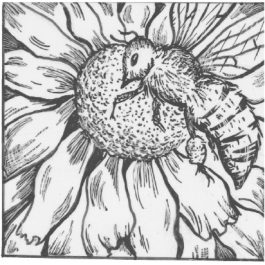Our human history is linked with the honeybee. Honeybees and their honey have been used in cooking for thousands of years. Honey was given as a medicine and was used to treat wounds and for many other purposes. I use Manuka honey from New Zealand regularly around the house for just about everything, so for the love of bees, bee kind!
Today’s story, Messenger for the Bees, is a great reminder to give a nod to our little furry yellow friends. Without bees, our food supply would disappear. The importance of these little fluttery friends can’t be overestimated. They help us grow crops, pollinate plants and flowers and make them produce fruit. Did you know that there are about a thousand different species of bees? Yes, we humans have domesticated these animals for many years now as beekeepers. However, we still owe our relationship with the bees to nature.
When I see a bee out in the world, I like to wave “hello!”, and my daughter even tells them “great work!” when she sees them working on the flowers. If you have a backyard or a garden, be good to the bees! In today’s piece, we’ll hear the author’s story about the loss of over 100,000 bees, and what he’s done since that violence occurred on his farm.
For the Love of Bees, Bee Nice!
This story comes from our archive that spans over 30 years and includes more than 130 magazine issues of GreenPrints. Pieces like these that inject the joy of gardening into everyday life lessons always brighten up my day, and I hope it does for you as well. Enjoy!

Messenger for the Bees
By Chris Burley of Daly City, CA
“Though the problems of the world are increasingly complex,
the solutions remain embarrassingly simple.”
— Bill Mollison

Where would our gardens be without bees? Bees are messengers of love. They flutter around, getting drunk on nectar. They carry sex on their furry bodies while spreading pollen from one flower to the next. They even do little dances to invite their hive mates to join the party. Without their playful exchanges, our world would be a much less colorful place. Trust me. I know.
In the summer of 2010, two of my beehives at Hayes Valley Farm, a 2.2 acre urban farm in the center of San Francisco, were found sprayed with insect killer. More than 100,000 bees died. Someone had trespassed onto the farm in the night to kill them.
My initial reaction was fierce anger. I suspected a neighbor and felt an overwhelming sense of distrust. I mourned for the bees. Many people fear bees. Most don’t know that honeybees don’t sting unless provoked, and that bees are responsible for pollinating 85% of our plants and one in every three bites of food we take.
I recently launched Project Grow the Rainbow. With the help of people all across the country, we’re growing one million flowers for the declining bee population. I realized that education is needed and solutions can be simple. The Grow the Rainbow Project is my offering to the bees and to my six-month-old son.
Especially after that violence, I choose to believe that a more beautiful world is possible. I choose to be a solution. I have to be, for my son. I want him and everyone else to know that with each frustration, each bit of stress, and each annoyance, comes an opportunity to “bee” the change we wish to see in the world.
May we all become messengers of love for the bees.
By Chris Burley of Daly City, CA, published originally in 2015, in GreenPrints Issue #103. Illustrated by Blanche Derby

What else do you love about bees, and what habits have you changed for the love of bees?



An important message. I remind people every Spring on FB that we owe our survival to the little furry creatures, and to leave dandelions alone as they are important to the bees.
My husband is a beekeeper with about 20 hives. We nourish these babies with our wildflowers and nutritious sugar water to keep them going in all seasons of the year. They are amazing creatures who give so much in their short lifespan to sustain our lives. Anything we can do for our honeybees will benefit us and keep food growing in our gardens. Love the bees and keep them safe. Plant more flowers and watch what they can do.
I put some cosmo seeds in my flower bed, in which I never planted before. They really took off and I didn’t realize they grew so tall. I will say the bees ???? loved them. I had lots of bees pollinating on them everyday. And No they don’t sting because I would be clipping the old ones off with bees everywhere, and I am allergic to stings, so thankful for no stingers!